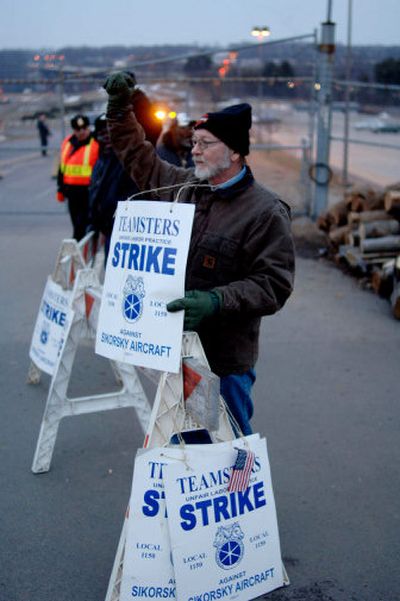Workers fight cuts in benefits

STRATFORD, Conn. – Michael Blake, one of more than 3,000 striking Sikorsky Aircraft employees, sat in the cold on a noisy picket line this week worried about his latest tumor.
“Two days before the contract, I had another one pop out on my arm,” said Blake, 57, who has cancer. “I have to stay on this medication the rest of my life.”
Using a makeshift bench supported by tree stumps, he rested his arthritic legs, a side effect, he said, of his cancer medication. A fire burned in a trash can as workers screamed over a megaphone for better medical benefits.
For Blake and other workers around the country, contract proposals that would force them to pay more for medical coverage have become a fight worth taking to the streets.
“When it comes to a strikable issue, workers don’t want to give up what they’ve earned in terms of health care coverage,” said Robert Bruno, associate professor of labor relations at the University of Illinois. “It’s sort of the deepest wound you can cut.”
Sikorsky, the helicopter-making unit of Hartford-based United Technologies Corp., has proposed doubling health care co-payments in the first year of a three-year deal and raising them another 15 percent over the next two years, union officials said. It’s the same plan given to Sikorsky’s 6,000 salaried employees, the company said.
“I think it could embolden other companies if they succeed to cut back on health care costs by passing it off on other employees,” said Paul Nisbet, an aerospace analyst with JSA Research Inc. in Newport, R.I.
Medical benefits have become the central issue in major labor disputes across the nation as companies deal with spiraling costs while an aging work force is increasingly placing a premium on coverage:
•In New York, the city’s 33,000 transit workers rejected a new contract last month over a provision that would have required them for the first time to contribute part of their salaries toward health care premiums.
•Employees at Macy’s department stores, part of Federated Department Stores Inc., have authorized a strike over proposed increases in health care costs if talks fail.
•General Motors Corp. and Ford Motor Co. recently won concessions from the United Auto Workers to help with spiraling health care costs.
•Boeing Co. recently settled a strike by decreasing premiums for some medical insurance plans and placing caps on insurance premiums.
Premiums keep rising
Health insurance premiums rose 9.2 percent last year, the first time since 2000 the growth rate was less than 10 percent, according to a recent survey by the Kaiser Family Foundation, which specializes in health care research.
About 60 percent of companies are providing coverage, down from 69 percent in 2000, the survey found. Workers now pay on average $1,094 more in premiums for family coverage than they did six years ago, Kaiser said.
Sikorsky said its health care costs this year would be more than $16,000 per employee for family coverage, up from $9,800 four years ago. Under the proposal rejected by the union, the company would have paid 82 percent of health care costs, better than the national average of 75 percent, company officials said.
“What we’re trying to do is deal with those costs and do it in a way that allows us to remain competitive,” said Ed Steadham, a Sikorsky spokesman.
The strike at Sikorsky is the company’s first in Connecticut since 1963. The workers, who normally make about $25 an hour, receive strike pay of $220 a week, union officials said.
United Technologies earned $3.07 billion last year, up from $2.67 billion in 2004.
Sikorsky officials say the three-year contract proposal was generous, offering 3.5 percent annual pay raises, pension improvements and a $2,000 ratification bonus.
But more than 3,000 workers with Local 1150 of the Teamsters overwhelmingly rejected the contract and voted Sunday in favor of the strike.
Union officials say the money allocated for bonuses and incentives in the proposed contract should instead be used to pay for health care.
Health care is a major concern, because the average age of workers is 48, union officials said.
Blake, a father of two, called the bonus a “teaser” that pales compared to the thousands of dollars his medications cost each month. “That won’t cover a year worth of prescriptions,” Blake said. “The change in the medical plan will quadruple my costs.”